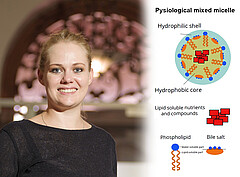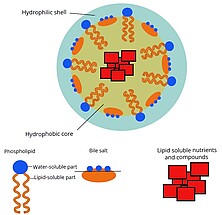BW Foundation's Elite Program
€139,000 for Hohenheim Postdoc [19.03.21]

Image: Johanita Kruger-Malan
Not only is a balanced intake of essential nutrients and energy crucial for a healthy diet, but bioactive compounds, such as secondary plant compounds, also make an important contribution to strengthening the immune system.
However, it is not only the quantity absorbed via food, dietary supplements, or medications that is decisive, but in particular the proportion that arrives unchanged in the bloodstream. This is because the bioavailability of numerous bioactive compounds is actually very low when taken orally.
"In order for bioactive compounds to be absorbed into the body, they must be incorporated into micelles, which act as emulsifiers and make them soluble in the aqueous intestinal environment. When sufficient fat is consumed, the body produces physiological mixed micelles in the small intestine for this purpose. But to improve bioavailability, the bioactive substances can also be incorporated into artificial micelles before consumption," explained Dr. Johanita Kruger-Malan.
A sabbatical year turned into a new center of life
Since her doctorate, she has never let go of this field of research. As a doctoral student at the Universities of Pretoria (South Africa) and Davis (USA), she worked on the bioavailability of minerals from various cereals and processed cereal products. An important background to this was the question of how the intake of nutrients can be improved in traditional diets in developing countries.
The South African nutritionist came to Baden-Württemberg in 2016, having been granted a sabbatical year by the University of Pretoria to round off her promising research at the University of Hohenheim with the help of human studies. In 2021, Dr. Kruger-Malan is still living in Swabia: in the meantime, she is leading a DFG research project at the University of Hohenheim which she herself procured, and which looks at previously unknown absorption pathways of PS80 micelles using the example of the active ingredient curcumin.
Mehr Infos zum Eliteprogramm für Postdocs |
|
"As obesity increases in the population, low-fat diets are increasingly promoted. However, these can have the undesirable side effect that fat-soluble bioactive substances are absorbed to a lesser extent. The goal of the DFG project is to better understand basic absorption mechanisms of phsysiological mixed micelles in order to optimize the uptake of health-promoting compounds in low-fat diets."
Enlarged research team thanks to elite program
Currently, however, the nutritionist is not in the lab. That's because Dr. Johanita Kruger-Malan has not only put down roots in Baden-Württemberg in terms of research in recent years; in the meantime, she has also started her own family here. The news that she had been approved for funding through the Baden-Württemberg Foundation's elite program reached her during her one-year parental leave.
"Of course I was very happy about that. When I return from my maternity leave in June, I will be able to continue my research with an enlarged team and expand the current DFG project to include further questions from the field of basic research. I would also like to take this opportunity to thank the Research Support Department, which provided me with excellent assistance during the application process," said Dr. Malan.
The total funding amounts to €139,000. 70% of this is earmarked for a doctoral position. The University of Hohenheim itself is contributing an additional 10% of the funding amount from its own resources to finance a technical assistant (25% position).
Next career goal: professorship

Das Eliteprogramms ermöglich es Dr. Malan, das ihr DFG-Forschungsprojekt zur Identifizierung unbekannter Absorptionsmechanismen von nativem und mizellarem Curcumin um weitere Fragen zu ergänzen. Im Fokus: physiologischen Mischmizellen.
But in addition to the approved funds, the application also had another positive side effect for the ambitious nutrition scientist: "It was an occasion for me to deal more intensively with the topic of career planning. I have set myself the goal of completing my habilitation in two years and then applying for a professorship," said Dr. Kruger-Malan.
Indeed, the career phase between a doctorate and one's own chair is associated with a variety of challenges: Excellent research and outstanding publications are just as essential as teaching experience and involvement in science management or university committees. With its elite program for postdocs, the Baden-Württemberg Stiftung aims to provide excellent scientists with targeted support in this difficult balancing act.
"So far, I have focused primarily on the research itself," stated Dr. Kruger-Malan. "In the next few years, I would now like to catch up, especially in terms of teaching experience. In this context, I find the Humboldt reloaded format, for example, very exciting. I would also like to get more involved in the organization of conferences. The elite program is an incentive for me to now consistently pursue the goals I set for myself in the application process."
Application procedure for the Elite Program
The number of possible applications per university is limited (Hohenheim: currently 4 applications per year). Therefore, a two-stage university-internal pre-selection takes place first. For the first stage, interested postdocs submit a 1 to 2 page outline of the project idea as well as a qualification concept, which includes, among other things, a scientific curriculum vitae and future steps for strategic career planning.
In the second stage, a personal presentation takes place before the selection committee (Senate Commission for Research), in which up to 4 postdocs are selected. After a positive decision, they then have about 6 weeks to prepare the complete application. The Research support Department offers assistance in this process.
Text: Leonhardmair / Translation: Neudorfer